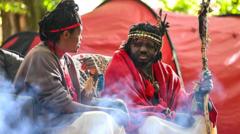Is a Woodland Camp Eviction Unfolding for a Scottish Tribe?

Published: 2025-09-16 08:55:31 | Category: technology
This article explores the ongoing eviction of the self-proclaimed Kingdom of Kubala from privately-owned land in the Scottish Borders, where group members claim ancestral rights to the territory. The situation has drawn attention due to the group's growing online presence and their assertion that they are reclaiming land taken from their ancestors four centuries ago.
Last updated: 28 September 2023 (BST)
Background of the Kingdom of Kubala
The Kingdom of Kubala is a self-styled group that emerged in the Scottish Borders, primarily represented by Kofi Offeh, Jean Gasho, and Kaura Taylor. Since their arrival in spring 2023, they have gained significant attention on social media platforms, amassing over 100,000 followers on TikTok and Facebook. Their narrative revolves around the belief that they are reclaiming land that was unjustly taken from their ancestors 400 years ago, and they have established an online presence to share their story and garner support.
Key Takeaways
- The Kingdom of Kubala claims ancestral rights to land in the Scottish Borders.
- Police and sheriff officers are enforcing an eviction order against the group.
- Local authorities assert the group's presence is illegal and disruptive.
- The group has a significant following on social media.
- Authorities have attempted to engage with the group but report a lack of cooperation.
Legal Context and Eviction Orders
The legal situation surrounding the Kingdom of Kubala is complex. Sheriff Peter Paterson issued an eviction order after the group failed to comply with a previous instruction to vacate their campsite. This order was primarily driven by the landowners, David and Mary Palmer, who successfully sought legal action after the group ignored local council directives.
According to Scottish Borders Council, the group has repeatedly disregarded the law by occupying land that does not belong to them. Councillor Scott Hamilton expressed disappointment over the group's refusal to engage with the authorities, stating that they had been given multiple opportunities to discuss their situation but chose to ignore the help offered.
The Kingdom's Claims
At the heart of the Kingdom of Kubala's narrative is the assertion that their ancestors were dispossessed of their land centuries ago. This claim is often linked to broader discussions about indigenous rights and reparations. In their view, the establishment of the Kingdom is a form of reclamation and cultural revival.
Understanding Ancestral Land Claims
Ancestral land claims refer to the assertion that a group has historical rights to land based on their lineage and cultural heritage. These claims can arise from various historical injustices, including colonialism, displacement, and land theft. In the UK context, such claims can be contentious, especially when they conflict with private land ownership rights.
The Role of Social Media
The Kingdom of Kubala has utilised social media as a powerful tool for outreach and support. Their significant following on platforms like TikTok and Facebook allows them to broadcast their message widely, drawing attention to their situation and rallying support from sympathisers. The online presence has played a crucial role in shaping public perception and garnering media attention.
Pros and Cons of Social Media Activism
- Pros:
- Widespread dissemination of information.
- Community building and support mobilization.
- Increased visibility for underrepresented issues.
- Cons:
- Potential for misinformation to spread.
- Public backlash and criticism from opposing viewpoints.
- Legal ramifications and challenges related to claims made online.
Local Government Response
Scottish Borders Council has taken a firm stance against the Kingdom of Kubala's encampment, citing legal obligations to protect private land ownership. The council's efforts to engage with the group have been met with resistance, leading to the decision to pursue legal eviction. This highlights a broader tension between community rights and individual land ownership.
The Implications of the Eviction
The eviction of the Kingdom of Kubala raises several questions regarding the balance between indigenous claims and established property rights. While the group asserts their right to reclaim ancestral land, local authorities maintain that their actions violate the law. The outcome of this dispute may set a precedent for similar cases in the future, particularly concerning land claims by other groups.
What Happens Next?
The immediate future for the Kingdom of Kubala remains uncertain. With the eviction order in place, the group faces the possibility of being forcibly removed from their encampment. The local authorities have indicated that they will not allow the situation to continue, suggesting that further legal action may be taken if the group does not comply.
As the situation unfolds, it will be essential to monitor both the legal developments and the public response. The intersection of land rights and cultural heritage continues to be a contentious issue, and this case may provide insights into how such disputes can be navigated in the UK.
Conclusion
The Kingdom of Kubala's attempt to reclaim ancestral rights to land in the Scottish Borders has sparked a complex legal and social debate. While they seek recognition and reclamation, local authorities are tasked with enforcing property laws. This situation encapsulates the ongoing struggle between historical grievances and contemporary legal frameworks, raising important questions about justice and restitution in the modern age. As the eviction process proceeds, it invites reflection on the balance between land rights and cultural heritage in today's society.
FAQs
What is the Kingdom of Kubala?
The Kingdom of Kubala is a self-proclaimed group in the Scottish Borders, claiming ancestral rights to land they believe was taken from their ancestors 400 years ago. They have gained significant attention on social media.
Why are the authorities evicting the Kingdom of Kubala?
Authorities are evicting the Kingdom of Kubala because they are occupying privately-owned land without permission, which is deemed illegal under current property laws.
What are the implications of their claims?
The group's claims highlight ongoing issues related to land rights, indigenous heritage, and the complexities of legal ownership versus historical grievances, potentially influencing future cases.
How has social media influenced the situation?
Social media has played a crucial role in raising awareness about the Kingdom of Kubala's claims, helping them gather support and visibility, while also inviting scrutiny and criticism.
What happens if the group refuses to leave?
If the Kingdom of Kubala refuses to comply with the eviction order, local authorities may take further legal action to enforce the eviction, potentially leading to a forced removal.



